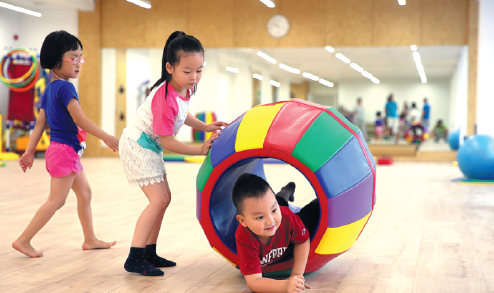Rural children more vulnerable to delayed brain development
China Daily ,August 17, 2017 Adjust font size:
|
Students play games at a kindergarten in Beijing. WANG JING/CHINA DAILY |
"The development of the human brain continues during our entire lives. But stimulation through proper interactions between caregivers and babies is crucial because it contributes to better neural connections and improved brain function in the future," Liu said.
A study supported by UNICEF shows that about one-third of poor rural children younger than 3 have suspected developmental delays in areas such as communications, problem-solving and social or cognitive development.
"One of the challenges I see when I visit poor communities in China is that the majority of children are left in the care of grandparents who do not have the knowledge or tools to feed the brain and stimulate the social and emotional development that must happen in those first three years," said Rana Flowers, UNICEF's representative to China.
She said this period of crucial brain development requires a combination of the best possible nutrition, quality healthcare, trained staff members to stimulate different parts of the brain to connect and develop, and caregivers who have been trained in activities, such as playing music, that children can practice at home.
"Without timely interventions, these children are at risk of developmental delays. Without this specific focus, evidence confirms that as adults they will lose around 26 percent of the average adult income per year," she added.
Research has shown that investing in early childhood development, or ECD, programs yields a 7 to 10 percent rate of return, according to Flowers, who added that the returns include children's improved career prospects, as well as reduced costs for remedial education and lower expenditure on healthcare and the criminal justice system.
A growing movement
In recent years, a growing number of metropolitan parents have embraced ECD.
"Many mothers have their first baby after good preparation in terms of psychology and understanding. They want to invest more in raising their kid to be a better person with strong competiveness in the future," said Wang Wei, 43, the mother of a 10-year-old girl, who has run a center that provides drama workshops for children since 2009.
When she became pregnant 10 years ago, Wang started reading books related to ECD. When her daughter was 3 months old, Wang took a class at a community center that provided training for new mothers.
"It's important to communicate with the baby, even from the gestation period-for example, by echoing every movement. We were also encouraged to strengthen the baby's sense of balance by rocking the cradle. Those things contribute to better brain development," she said.
At age 20 months, Wang's daughter began attending a bilingual kindergarten in Beijing. When the girl was3, Wang hired a Filipino nanny to help her learn English. A year later, she began Spanish classes.
"Spanish is the world's second most-commonly used language. Children are most receptive to language learning before age6. Learning Spanish not only helps the development of her brain's linguistic functions, but it will also be useful if she'goes global' in the future," Wang said.
